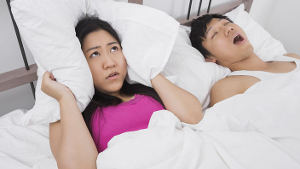Obstructive Sleep Apnea and Dreaming

WHILE OUR MAIN FOCUS HERE IS THE REMEMBRANCE AND EVENTUAL conscious participation in our dream life I am also quite interested in anything related to type and quality of sleep, what makes it better or worse, and how to set up the best circumstances for the most conscious activity while dreaming. One major factor in many peoples’ lives – up to 18 million people in the USA alone – is the condition known as OSA or obstructive sleep apnea. This is a condition in which the air passages in the throat droop and close during sleep and thereby prevent clear passage of air or it may even prevent any air passage. This leads to the sleeper awakening sometimes gasping for air potentially many times a night and effectively keeps the individual from getting a healthy night’s sleep. Snoring to the extent that one’s sleep partner may not be able to sleep and has to temporarily or permanently move to another room. OSA can also be very stressful for the partner when hearing the sufferer stop breathing and then struggling to inhale through blocked passages. Even if a person is in bed and essentially unconscious for 7-8 hours if OSA is experienced she or he can awaken sometimes feeling less rested than when she went to bed. This can cause headaches in the morning and bouts of overwhelming drowsiness during the workday which causes the experiencer to struggle to stay awake for even the simplest of tasks. This drowsiness becomes a dangerous condition when it descends on someone while she's driving an automobile.
Because of the constant interruption of sleep the approximately 20% of REM (rapid eye movement) sleep, considered to be the period of most active dreaming, is interrupted. This can cause a significant reduction of dream recall such that OSA sufferers are only about 43% likely to remember dreams compared to the 71% of non-sufferers.* OSA leads to other complications such as reduced memory, increased risk of depression, obesity and stroke and heart disease.
In some increased stress and anxiety can worsen the condition. It can also increase a propensity for nightmares of the dreams that are remembered. OSA is also sometimes correlated with obesity but often times it is not. As such improvement of one’s diet and caloric intake could reduce OSA to a non-threatening level but that is not yet completely proven to be true.
Positive diagnosis of OSA is accomplished by an overnight test performed at a hospital sleep clinic. In this situation the “patient” has numerous sensor wire leads (electrodes) attached at strategic points of the body so heartbeat, respiration, blood oxygen level all can be monitored by a team during an overnight stay and sleep session at the clinic. Sounds of breathing are recorded and analyzed in conjunction with the resulting data collected from the body and a diagnosis is derived from this.
A simple way to do an initial diagnosis of OSA – in addition to observing the various symptoms noted above – is to use some sort of an app in ones cell phone that monitors the sounds of breathing overnight and produces an graph and assessment of sleep quality and activity the next morning. If your mate tells you that you snore and you don’t believe it such apps will tell you the truth when you hear the recording of yourself snoring like a freight train the next morning.
A remedy for OSA commonly in use these days is a CPAP (constant positive air pressure) machine. Various nose pads or breathing masks are used to maintain a small positive pressure above atmospheric pressure of your room such that the lungs and airway remain more inflated and therefore open than they otherwise would with OSA. This prevents breathing stoppage and sleep interruption. These systems must be adjusted to each user by qualified physicians and technicians to optimize each person’s sleep experience.
If you think you suffer for obstructive sleep apnea it is recommended you speak with your physician to arrange an overnight diagnosis at a sleep clinic so you can get a proper assessment. This could significantly improve your quality of sleep and life (as well as in extreme cases possibly lengthen or save a life!) And it could significantly increase your ability to remember your dreams and thereby help you make major progress in extending your consciousness into the subtle world by removing this difficult obstacle!
* See this URL for the full paper reporting the study: http://jcsm.aasm.org/viewabstract.aspx?pid=27713
Copyright © 2024, SubtleRealm
